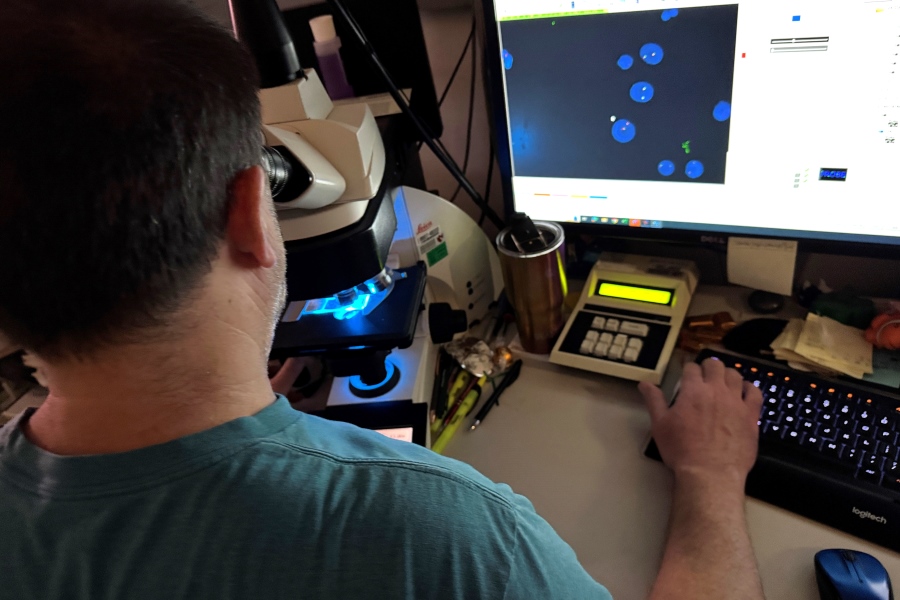Laboratory Genetics and Genomics Fellowship
As a Laboratory Genetics and Genomics (LGG) Fellow at the University of Nebraska Medical Center, you will be at the forefront of genetic diagnostics and research, contributing to the advancement of personalized medicine. This immersive two-year program offers hands-on experience in both clinical cytogenetic and clinical molecular genetic tests, with a strong focus on the clinical application of genomic tests. The program director is Dr. Zhenya Tang and the associate program director is Dr. Sahara Cathcart.
Fellows work closely with a multidisciplinary team—including geneticists, clinicians, and bioinformaticians—to investigate the genetic basis of inherited disorders, cancers, and other complex diseases. You'll participate in interpreting both clinical cytogenetic and molecular genetic analyses essential for diagnosing and managing human genetic diseases, including chromosomal microarray, high-throughput sequencing (such as whole exome sequencing and whole genome sequencing) data, to identify meaningful genetic variants and support clinical decision-making.
In addition to laboratory rotations, you’ll gain expertise in:
- Genetic test development and validation
- Clinical case sign-out and report generation
- Laboratory management and regulatory compliance
- Bioinformatics and data interpretation
You’ll also have the opportunity to engage in research projects, contribute to peer-reviewed publications, present at national meetings, and mentor trainees—shaping both your academic portfolio and your leadership skills.
This fellowship provides not only a deep dive into genetic technologies and data analytics but also a meaningful connection to patient care, preparing you to become a board-certified clinical laboratory geneticist ready to make a tangible impact in modern medicine.
From the Directors

Zhenya Tang, MD, PhD, FACMG, Director
We invite you to apply for our Laboratory Genetics and Genomics (LGG) fellowship. This innovative 24-month program offers comprehensive training in clinical cytogenetics/genomics, clinical molecular genetics/genomics, biochemical genetics/genomics, and clinical genetics/genomics across various laboratories and clinics.

Sahara Cathcart, MD, Associate Director
Our primary goal is to train prospective laboratory directors to be proficient in overseeing both clinical cytogenetic/genomic and clinical molecular genetic/genomic analyses. The program provides fellows with clearly defined, graduated responsibilities and delegated authority.
Additionally, fellows will have the opportunity to develop translational research projects within the scope of laboratory practices.
YEAR 1 – FOUNDATIONAL TRAINING
6 months of Clinical Cytogenetics and Cytogenomics
Fluorescence In Situ Hybridization (FISH)
Chromosomal microarray (CMA)
Quality control and result reporting
5 months of Clinical Molecular Genetics and Genomics
PCR, qPCR, Sanger sequencing
Next-Generation Sequencing (NGS) (panels, exomes)
MLPA, Southern blotting (as applicable)
Variant interpretation (ACMG guidelines)
Inherited and acquired conditions
1 month of Clinical Biochemical Genetics (offsite)
Variant annotation, pipelines
Hands-on interpretation with bioinformatics team
Karyotyping (prenatal, postnatal, cancer)
1 month of elective
YEAR 2 – ADVANCED PRACTICE & LEADERSHIP
5 months of Clinical Cytogenetics and Cytogenomics
Interpretation of Cytogenetic Findings Across Clinical Contexts
Laboratory Workflow, Quality Control, and Troubleshooting
Clinical Utility and Appropriate Test Selection
Report Writing and Regulatory Compliance
Integration with Molecular Data and Multidisciplinary Collaboration
6 months of Clinical Molecular Genetics and Genomics
Comprehensive Variant Interpretation Using ACMG Guidelines
NGS Data Analysis and Quality Assessment
Test Design, Validation, and Limitations
Clinical Integration and Communication
Ethical, Legal, and Counseling Considerations in Molecular Genetics
1 month of Clinical Genetics (offsite)
Clinical Indications for Genetic Testing
Phenotype-Genotype Correlation
The Art of Communicating Genetic Test Results
Test Utilization and Limitations
Multidisciplinary Collaboration & Role of the LGG Specialist
1 month of elective
Details of the salary, benefits, and support network can be found on the College of Medicine's Residencies and Fellowships webpage.
Our department provides additional support to its molecular genetics fellows to enhance their career:
- $1,000 professional development allowance per fellow for the support of academic books, board examinations and continuing education
- Fellows are encouraged and supported by the department to present at scientific meetings. The department funds up to $2,500 in travel to professional meetings where the fellow presents their research.
- $10 per day meal card
- Close, covered, convenient parking
- A UNMC-identified lab coat and a set of black scrubs
- Access to Immunoquery, ExpertPath and PathPrimer; ASCP-Rise study sets; WHO series; and Biorender; other board preparations will be made available.
UNMC, and its hospital partner, Nebraska Medicine, are home to the NCI-designated Fred & Pamela Buffett Cancer Center, Munroe-Meyer Institute for Genetics and Rehabilitation, Lied Transplant Center, Michael F. Sorrell Center for Health Science Education and Nebraska Public Health Laboratory, which will provide enhanced experiences in molecular diagnostics.
Being part of such a growing and innovative campus, we can offer our house officers with state-of-the-art facilities and resources. In our department alone, we have 23 primary research laboratories, lead 10 shared resource cores across campus, and direct two University of Nebraska-designated research centers. In addition to the departmental library, the McGoogan Health Sciences Library on campus has over 175,000 books and 2,400 journals. These facilities and resources are available for all of our fellows to provide them with a varied and extensive training experience.
Eligibility:
Applicants must have a:
- A doctoral degree (MD, DO or PhD) from an accredited institution. The PhD (or equivalent) degree must be obtained in either genetics or a related field.
- Graduates from a medical school outside of the United States or Canada must hold a valid certificate from the Educational Commission for Foreign Medical Graduates (ECFMG) prior to appointment.
- Eligibility for ABMGG certification in Laboratory Genetics and Genomics.
- Strong background in genetics, molecular biology, bioinformatics or related biomedical sciences.
Application Requirements:
- Current CV
- Personal statement
- Three letters of recommendation
- Official transcripts and proof of doctoral degree
- Valid ECFMG certification (for international medical graduates, if applicable)

Laboratory Genetics and Genomics Applications
We are currently accepting applications for July 1, 2026.

Dani Blum
Fellowship & Educational Programs Coordinator
Contact Dani Blum to apply!